Donald Trump’s election win has world leaders in a spin
JEENAH MOON/POOL/AFP/Getty
Although it wasn’t on the agenda at the three-day IISS Prague Defence Summit in the Czech Republic capital from November 8, there was only one topic of discussion: U.S. President-elect Donald Trump. His imminent return to the White House has had NATO members quickly reassessing their plans for supporting Ukraine’s defense against Russia’s invasion as well as their spending commitments to the group. Experts say that although Trump is perhaps unlikely to pull the U.S. out of NATO, the coming years will be challenging for the alliance, not least because many countries have failed to prepare for Trump’s comeback.
“It’s a bad surprise for most governments in Europe,” former NATO official Edward Hunter Christie told Newsweek. “European policymakers feared—and they never concealed it—they feared the prospect of a second Trump presidency.”
In February, Trump said he would “encourage” Vladimir Putin‘s Russia to launch attacks on any NATO countries he said were falling short of financial commitments to the alliance. Then-NATO chief Jens Stoltenberg—succeeded in October by the Netherlands former leader Mark Rutte—said at the time that any suggestion that “allies will not defend each other undermines all of our security.”
Trump has also repeatedly said that he would put a stop to the more than two-and-a-half years of war in Ukraine “within 24 hours” should he be reinstalled in the White House, although few at the IISS believed that would happen.
“I don’t think it is realistic, but at the same time I believe that he will make an effort to end this war and to make a deal with President Putin,” said Czech President Petr Pavel, a retired general and former chairman of NATO’s military committee. “It will most probably not be in our interest and in the interest of Ukraine to have such a deal.”
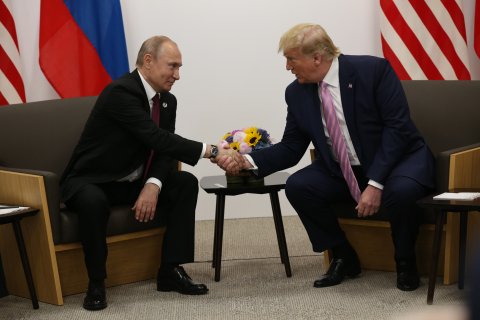
Mikhail Svetlov/Getty
The nomination of Marco Rubio to Trump’s cabinet as Secretary of State will have added to fears over U.S. support for Ukraine’s fight against Russia. Rubio, during Trump’s first term as president between 2017 and 2021, cosponsored legislation that would make it harder for the U.S. to pull out of NATO. However, earlier this year, Rubio joined 14 other Republican senators to vote against a $95 million military aid package to Ukraine, which was eventually passed in April. He has also stated that he is in favor of cutting a deal with Russia to end the conflict.
“I’m not on Russia’s side, but unfortunately the reality of it is that the way the war in Ukraine is going to end is with a negotiated settlement,” Rubio said in September. Still, for some NATO members, there is hope. Hanno Pevkur, defense minister of Estonia, on NATO’s frontier with Russia, told Newsweek: “I’m not so pessimistic as many are.”
He said it is too early to say how rhetoric from the campaign trail will translate into official policy. “Campaigning is one thing,” he added. “Real life is a bit different.”
It was the same the last time Trump was in the Oval Office, Pevkur said. “We saw that actually the foreign and defense policy actually wasn’t so bad…. I believe Trump doesn’t want to be on the loser side.” One of the biggest issues for NATO’s European leaders is raising its defense spending to meet or exceed the alliance’s 2 percent of GDP target, which many have undershot for years. Pavel said at the conference that European nations were always going to have to do more to shore up their defenses, but “with President Trump, we will probably have to do it faster.”
“With the experience of his first term, when he came to NATO with a shocking message that the United States would not defend anyone who is not paying enough, we were shocked because we were not used to that kind of approach,” Pavel said.
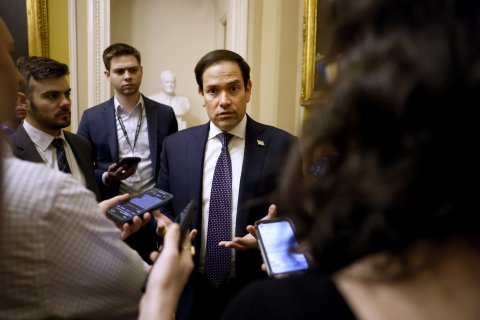
Anna Moneymaker/Getty
“Of course, the message was absolutely right,” the Czech president added. “Only predecessors of Donald Trump presented it in a much more comfortable way. That was the reason why, most probably, that European allies were not listening with such attention.”
Both France and the U.K., whose leaders Emmanuel Macron and Sir Keir Starmer put on a show of strength and unity at a Veterans Day ceremony in Paris on November 11, have pledged to meet their respective 2 percent and 2.5 percent defense spending targets, although they will not be reached until near the end of this decade. Whether that will be fast enough for the incoming Trump administration remains to be seen.
Trump “always comes with strategic uncertainty,” Lithuanian Defense Minister Laurynas Kasčiūnas told Newsweek. “It’s his modus operandi.”
Putin, with whom Trump sought closer relations during his previous time in office, has welcomed the president-elect’s threat to cut off Washington’s multibillion-dollar military aid to Kyiv and vow to pursue a plan that would put a quick end to the war launched by Moscow in February 2022, though the Kremlin has sought to emphasize its neutrality in the U.S. election. With Trump set to be inaugurated on January 20, the Russian Foreign Ministry recognized there would still be challenges ahead.
“We have no illusions about the president-elect, who is well known in Russia, or the new Congress, where Republicans have reportedly won control,” the Russian Foreign Ministry said in a statement shared with Newsweek. “The U.S. ruling political elite adheres to anti-Russia principles and the policy of ‘containing Moscow.’ This line does not depend on changes in America’s domestic political barometer.”
Putin himself, at an international forum in Sochi on November 7, offered his congratulations to Trump and praised the president-elect for his reaction to an assassination attempt on July 13 in Butler, Pennsylvania. “His behavior at the moment of an attempt on his life left an impression on me. He turned out to be a brave man,” Putin said following a speech in the Black Sea resort. “He manifested himself in the very correct way, bravely as a man.” As to what he expects from a second Trump administration, Putin added: “I don’t know what will happen now. I have no idea.”
Putin also said that what Trump has said “about the desire to restore relations with Russia, to help end the Ukrainian crisis, in my opinion, deserves attention at least.”
Trump’s Stance on the Hamas-Israel War”
The gloom over Europe comes in contrast to a somewhat more positive response from some in the Middle East over the election of Trump, who has promised to “end all wars.”
“Congratulations on history’s greatest comeback!” Israeli Prime Minister Benjamin Netanyahu posted to X, formerly Twitter, along with a photo of him and his wife Sara with a smiling Trump. “Your historic return to the White House offers a new beginning for America and a powerful recommitment to the great alliance between Israel and America. This is a huge victory!”

GIL COHEN-MAGEN/POOL/AFP/Getty
Hamas appeared keen to hold Trump to his word to end wars, with their political bureau member and spokesperson Basem Naim telling Newsweek: “Palestinians look forward to an immediate cessation of the aggression against our people, especially in Gaza, and look for assistance in achieving their legitimate rights of freedom, independence and the establishment of their independent self-sovereign state with Jerusalem as its capital.”
Yemeni militant group Ansar Allah, also known as the Houthi movement, expressed skepticism that the president-elect would come through on his promise, though they said doing so would help alleviate economic woes. Not long after Hamas‘ October 7, 2023, attack on Israel, in which 1,200 people were killed and more than 250 kidnapped and taken back to Gaza, Ansar Allah began firing missiles and drones at commercial ships in the Red Sea—as well as at Israel—in response to Israel’s subsequent invasion of Gaza, in which more than 43,000 people have been killed, Palestinian health officials say. The attacks in the Red Sea have drastically reduced container traffic through the Suez Canal, raising costs as major shipping firms take longer routes to avoid the area.
“We believe that Trump will not fulfill his commitment to Arab voters and supporters of Gaza, whom he promised to stop the aggression on Gaza, but reality will answer that,” an Ansar Allah source told Newsweek. “America is paying an economic and military price because of its support for the aggression on Gaza and also because of its aggression on Yemen in service of Israel,” he added, “because we prevent American ships from crossing the seas adjacent to Yemen in response to the American aggression on our country, and this makes the American citizen bear the high prices and all because of the American administration’s policy towards our country in service of Israel.”
Here, the Ansar Allah source said, “the question remains: Will Trump continue with the same policy and will the American aggression against Yemen continue? If it continues, the American economy will suffer more losses.”
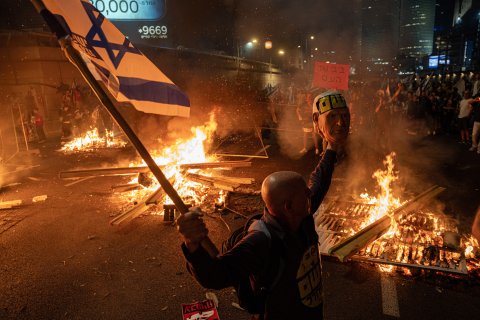
ORI AVIRAM/Middle East Images/AFP/Getty
During his previous time in office, Trump established close ties with Netanyahu and expanded military cooperation with Saudi Arabia as it helped Yemen’s internationally recognized government battle Ansar Allah, a member of the Iran-led Axis of Resistance that also includes Hezbollah and other factions. A U.N.-backed ceasefire has largely quieted Yemen’s civil war since April 2022, though Ansar Allah’s actions have again put the country on the front lines.
Other developments have also shifted the dynamics of the Middle East in ways that differ vastly from Trump’s first tenure in office. Last year, Saudi Arabia and Iran reestablished relations in a deal brokered by China, while Syria, led by the U.S.-blacklisted President Bashar al-Assad, returned to the Arab League after years of Russian campaigning.
But with the region now in flames over the conflict between Israel and the Axis of Resistance, Trump has expressed his desire to bring peace to the Middle East. This effort is likely to test the president-elect’s balance between anti-interventionist and hawkish tendencies.
In the lead up to the election, Trump called on Israel to “finish the job” against Hamas, while occasionally expressing criticism of Netanyahu for his handling of the conflict. On November 5, the day of the U.S. vote, Netanyahu fired his defense minister, Yoav Gallant, and handed the post to the more hawkish and closely aligned Israel Katz, who has expressed little appetite for any immediate ceasefire in Gaza or Lebanon.
Trump’s secretary of state pick Rubio, a staunch ally who serves on the Senate Foreign Relations Committee and is the leading Republican on the Senate Intelligence Committee, has also been outspoken in his support of Israel throughout its conflict with Hamas. In October 2023, Rubio said on X that Israel has “no choice but to seek the complete eradication of Hamas in Gaza.”
Rubio also warned that there is a threat of a full-scale war between Israel and Lebanon-based militant group Hezbollah. In May, he said: “I understand the imperative that Israel has at some point to address it, even though there’s a real threat there of a full-scale war with Hezbollah, which militarily is a lot more challenging and destructive.”
Tensions with Hezbollah along Israel’s northern border have increased since Hamas’ October 7 attack, with tit-for-tat missile attacks recently increasing to the killing of multiple high-ranking Hezbollah officials, including Hassan Nasrallah, who led the group for more than three decades. In September, thousands of pagers, and days later walkie-talkies, exploded simultaneously in Hezbollah strongholds in and around Lebanese capital Beirut, killing 39 people and wounding 3,400 more. Israel media reported that Netanyahu during a cabinet meeting claimed responsibility for the attack.
Rubio has apportioned the blame for the recent misery in the region to Iran’s leadership. In April, Rubio posted on X: “The primary source of violence, conflict, suffering and instability in the Middle East is the criminal ‘Islamic Republic’ regime which has also oppressed the people of #Iran for almost 25 years.”
Trump has long taken a tough stance on Iran. In January 2020, during his previous term, he ordered the killing of Iranian Revolutionary Guard Corps General Qasem Soleimani, who was considered the second most powerful person in Iran behind Supreme Leader Ayatollah Khamenei. Trump called Soleimani the “number one terrorist anywhere in the world.”
In 2018, the then-Trump administration reimposed harsh sanctions on the country after exiting Iran’s 2015 nuclear pact. Efforts to revive the pact have since failed, but Trump said in September that: “We have to make a deal, because the consequences are impossible.”
Fearing more sanctions and possible retribution from Trump, Iran’s currency fell to an all-time low of 703,000 rials to the dollar following his election. The regime has been sanguine in its response. “The U.S. elections are not really our business. Our policies are steady and don’t change based on individuals. We made the necessary predictions before and there will not be change in people’s livelihoods,” said government spokesperson Fatemeh Mohajerani, according to the semi-official Tasnim news agency.
However, the reaction from ordinary Iranians has been mixed. “One-hundred percent he will intensify the sanctions,” Amir Aghaeian, a 22-year-old student, told the Associated Press. “Things that are not in our favor will be worse. Our economy and social situation will surely get worse.”
However, another student, 21-year-old Parastou in Tehran, told Reuters: “Everyone is happy, and I am thrilled. Trump is a no-nonsense leader who will put pressure on the clerical rulers. This is good for the Iranian people who seek a democratic leadership.”
What Trump’s Election Win Could Mean for China
Before election day, Trump had been outspoken about the risk China poses, especially to the U.S. economy, and has threatened to impose tariffs of 60 percent on imported Chinese goods. At a roundtable discussion in Michigan in October, Trump waxed lyrical about levies, saying: “It’s the most beautiful word in the dictionary. You have a lot of words that are damn nice, like love. But I think it’s more beautiful than love—the word tariff.”
Lining up for his cabinet a pair of China hawks in Rubio and Michael Waltz as national security adviser could signal he takes the threat of China’s possible geopolitical ambitions around Taiwan, home to two-thirds of the world’s computer chip production, seriously.
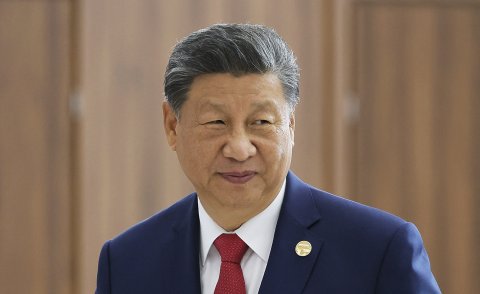
MAXIM SHEMETOV/POOL/AFP/Getty
Rubio has been an outspoken critic of China’s leadership during his time in the Senate. He cosponsored bipartisan legislation supporting the international standing of Taiwan, the self-ruled island that China has vowed to unify with, by force if necessary. He also cosponsored legislation banning imports suspected to be made with forced labor in China’s Xinjiang, as well as a bill requiring the U.S. government to report on human rights abuses in the majority-Muslim region. Chinese officials there have been accused of detaining as many as 1 million people in internment camps, which Beijing insists were reeducation camps.
Rubio was among the U.S. lawmakers Beijing targeted with sanctions in 2020 over his criticism of the situation in Xinjiang and China’s crackdown on democracy in Hong Kong. In September, Rubio introduced legislation to close loopholes to prevent China, Russia and other U.S. adversaries from circumventing tariffs.
Florida congressman Waltz, a retired Green Beret and National Guard colonel, is a member of the House China task force who has collaborated with Republican lawmakers to develop policies on China and has introduced legislation to decrease American dependency on Chinese minerals.
“South America offers a wide array of critical minerals that are needed to power our modern economy. It’s against our strategic interests for China to try and monopolize these exports and install military bases that can be used against us should a conflict arise over Taiwan’s sovereignty,” he said, referring to China’s claim on Taiwan.
Waltz supports expediting weapons exports to Taiwan to help it better defend against potential Chinese aggression. “We must learn from Ukraine by addressing the threat of the CCP [Chinese Communist Party] and arming Taiwan NOW before it’s too late,” he wrote on X in May.
Although the U.S., like most countries, does not officially recognize Taiwan diplomatically, it is the island democracy’s main supplier of arms, which Washington has sold for decades under the Taiwan Relations Act. These arms sales rile China, which considers them a violation of its sovereignty.
In May, Waltz said that the U.S. must do more to block fast-growing Chinese influence in the Caribbean and Latin America after Newsweek‘s report on China’s extensive involvement on the island of Antigua, located less than 1,500 miles from Miami.
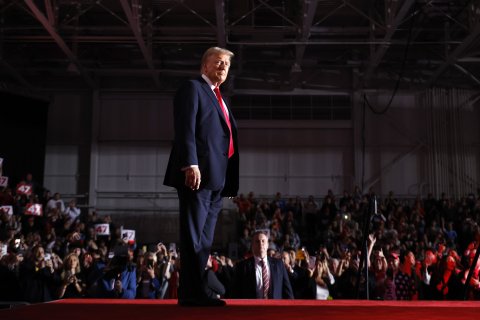
Chip Somodevilla/Getty
“The alarm bells are ringing over China’s increased presence in our hemisphere,” said Waltz, a member of the Armed Services and Foreign Affairs committees and the Select Committee on Intelligence.
Michael Sobolik, a senior fellow in Indo-Pacific studies at the American Foreign Policy Council and author of Countering China’s Great Game: A Strategy for American Dominance, called Waltz one of the House’s “most focused members on the issue” of China and said he has “worked consistently” on the behalf of political prisoners in the country.
In an interview with Newsweek, Sobolik said Rubio “is one of Washington’s most levelheaded, strategic thinkers on countering the Chinese Communist Party.”
“President-elect Trump’s picks for Treasury and Commerce will be telling, but early indications suggest tough days ahead for Beijing,” Sobolik added.
Eric Hontz, of the U.S. Chamber of Commerce-affiliated Center for International Private Enterprise in Washington, D.C., said he expects both Waltz and Rubio to mark a fresh approach to China relations.
“I think their legislative track record of viewing the Chinese Communist Party as a hybrid political-economic power will allow for horizontal thinking about new tools of economic statecraft,” he told Newsweek. “Their leadership on drawing attention to supply chain resilience and pursuing bipartisan legislation in coordination with a wide variety of stakeholders, including importantly the private sector, bodes well for innovative approaches to complex problems.”
China has warned Trump to handle issues related to Taiwan “prudently” to avoid “severely damaging” relations between Beijing and Washington.
In response to a question about Trump and Taiwan, Liu Pengyu, spokesperson for the Chinese Embassy in the U.S., told Newsweek: “The Taiwan question is the most important and most sensitive issue in China-U.S. relations. The U.S. government needs to earnestly abide by the One China principle and the three China-U.S. joint communiqués and prudently handle Taiwan-related issues so as to avoid severe damage to China-U.S. relations and cross-Strait peace and stability.”
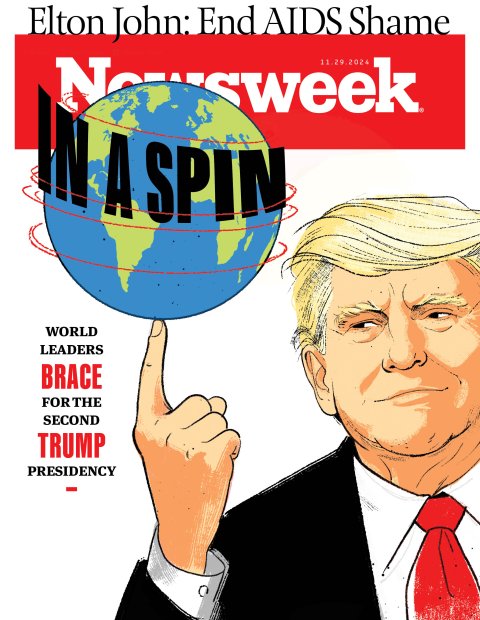
fairness meter
Click On Meter To Rate This Article

